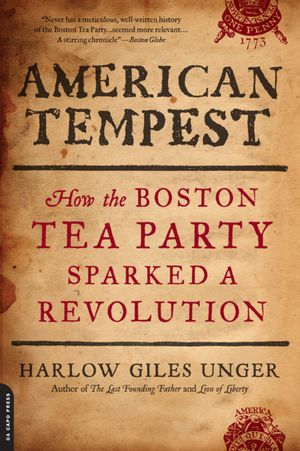Blackstone Audio, ISBN 9781441779120, February 2011
This is a clear, highly readable, and fascinating account of the Boston Tea Party, what led up to it, what followed, and how this became the spark that created the American Revolution.
Many things have been said and repeated about the Tea Party that simply aren't true. It wasn't about the tax on tea making tea unaffordable; the tea duty had been cut to the point it was undercutting the smugglers bringing in Dutch tea. It wasn't an act of vandalism by drunken thugs. the Tea Party crew were all responsible citizens, small merchants, professionals, farmers, and skilled craftsmen of Boston and the surrounding countryside. They were extremely careful to do no damage except to the tea, and to cause injury to no one.
The Tea Party was part of a rising tide of political discontent in the American colonies, arising out of conflicts between the interests of the colonies and Britain, and their lack of understanding of each other's positions. The British at home were heavily taxed to pay for the wars that had, among other things, protected the colonies. The colonists were paying almost nothing in taxes--and the colonies, beyond question, had the wealth to contribute to their own defense.
What they didn't have was either the understanding of what they were costing the mother country, or the hard currency with which taxes had to be paid.
Both sides in this conflict repeatedly tried to carry their point in ways that simply provoked and enraged the other side.
On the American side, the personalities involved are fascinating, complex, and only dimly familiar to us from grade school history class. Sam Adams is a far more interesting character than I had previously suspected, and his uneasy alliance with John Hancock, one of the few Boston plutocrats who came to side with the small merchants and the radicals in their opposition to British policy, is one of the most intriguing features of this account.
If you want to know more about the early history of the American Republic, this is a great place to begin.
Recommended.
I borrowed this book from the library.
This is a clear, highly readable, and fascinating account of the Boston Tea Party, what led up to it, what followed, and how this became the spark that created the American Revolution.
Many things have been said and repeated about the Tea Party that simply aren't true. It wasn't about the tax on tea making tea unaffordable; the tea duty had been cut to the point it was undercutting the smugglers bringing in Dutch tea. It wasn't an act of vandalism by drunken thugs. the Tea Party crew were all responsible citizens, small merchants, professionals, farmers, and skilled craftsmen of Boston and the surrounding countryside. They were extremely careful to do no damage except to the tea, and to cause injury to no one.
The Tea Party was part of a rising tide of political discontent in the American colonies, arising out of conflicts between the interests of the colonies and Britain, and their lack of understanding of each other's positions. The British at home were heavily taxed to pay for the wars that had, among other things, protected the colonies. The colonists were paying almost nothing in taxes--and the colonies, beyond question, had the wealth to contribute to their own defense.
What they didn't have was either the understanding of what they were costing the mother country, or the hard currency with which taxes had to be paid.
Both sides in this conflict repeatedly tried to carry their point in ways that simply provoked and enraged the other side.
On the American side, the personalities involved are fascinating, complex, and only dimly familiar to us from grade school history class. Sam Adams is a far more interesting character than I had previously suspected, and his uneasy alliance with John Hancock, one of the few Boston plutocrats who came to side with the small merchants and the radicals in their opposition to British policy, is one of the most intriguing features of this account.
If you want to know more about the early history of the American Republic, this is a great place to begin.
Recommended.
I borrowed this book from the library.

This would have been a useful book when I was in 6th grade. I had to write a 5 page report on the Boston Tea Party, and really there's not much to say: they dressed as Indians and threw the tea overboard.
ReplyDeleteOne, this is not just about the Boston Tea Party, but about the complex sequence of events, complex personalities, and unintended consequences that kept ratcheting upward the tension between the colonies and Britain, ultimately leading to the outbreak of war and the Declaration of Independence.
ReplyDeleteTwo, even the Boston Tea Party itself is a great deal more complicated than "they dressed up as Indians and threw the tea overboard."
Seriously, they did not teach you everything in 6th grade.